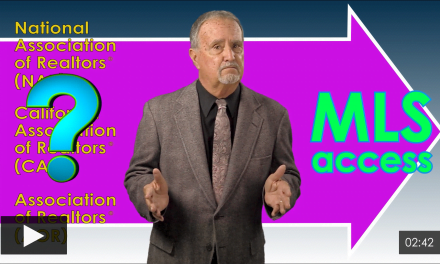This article is part of an ongoing series covering violations of real estate law. Here, the Department of Real Estate (DRE) revoked the California real estate license of a broker who misrepresented the status of his license under another state agency.
In September 2021, the California Department of Real Estate (DRE) decided by default decision to revoke the license of Michael Wayne Jacobs, a broker since 1997 operating out of Laguna Niguel, California.
In addition to his broker license, Jacobs also held a Certified Residential Appraiser License issued by the California Bureau of Real Estate Appraisers (BREA).
In January 2019, the BREA suspended Jacobs’ appraisal license due to non-payment of renewal fees and failure to respond to notifications for payment. Although Jacobs sent a check to the BREA with the intent to renew his license, the check bounced due to insufficient funds. The BREA’s efforts to notify Jacobs of the failed renewal did not receive a response.
Jacobs’ appraisal license remained suspended from January 11, 2019 through July 30, 2019. On July 30, 2019, Jacobs submitted payment for renewal. His suspension was lifted, and his appraisal license became active again.
However, despite the suspended status on his license during that period, Jacobs positioned himself as an actively licensed residential real estate appraiser in appraisal reports he conducted on seven properties between January 21, 2019 and July 25, 2019 — the period in which he was suspended.
On July 11, 2020, the BREA revoked Jacobs’ appraisal license after determining he:
- misrepresented himself as holding an active license when he did not;
- engaged in fraudulent and dishonest acts;
- failed to demonstrate honesty, candor, integrity and trustworthiness;
- failed to provide work files, when requested, to the BREA; and
- failed to maintain a current address with the BREA.
Consequently, the DRE likewise revoked Jacobs’ real estate license, since he:
- failed to report the BREA’s disciplinary action to the DRE within 30 days;
- knowingly distributed false representations relating to his credentials;
- committed acts that led to the revocation of a license from another state agency for acts that, when done by a real estate licensee, is grounds for revocation;
- demonstrated negligence and incompetence in conducting activities for which a license is required; and
- engaged in fraud and dishonest dealing.
In addition to losing his real estate license, the DRE also ordered Jacobs to cover the department’s investigation costs, which totaled $3,217.
Honesty as a policy — always
The standards governing a real estate licensee’s conduct contains, at minimum, the requirement that the licensee be competent and honest when dealing with members of the public. [See RPI e-book Real Estate Practice Chapter 1]
Since brokers are the agents of the members of the public who employ them, brokers owe duties to the various participants in a transaction, including:
- the fiduciary duty of utmost care, integrity, honesty and loyalty in dealings with a client; and
- the general duty of skill, care, honesty, fair dealing and good faith in dealings with all participants to a transaction. [Calif. Civil Code §2079.16]
Also, to be eligible for a broker or agent license, an applicant needs to be honest and truthful. [See RPI e-book Real Estate Principles Chapter 1]
Thus, honesty is a cornerstone of obtaining and maintaining a real estate license.
Related Video: Getting Started in Real Estate
Click here for more information on this topic.
Otherwise, the DRE has the authority to suspend or revoke the license of a real estate licensee who:
- distributes false representations or statements [Calif. Business and Professions Code §10177(c)];
- displays negligence in performing activities for which a license is required [Bus & P C §10177(g)]; and
- participates in conduct that constitutes fraud or dishonest dealing. [Bus & P C §10177(j)]
Even when a real estate licensee engages in these prohibited acts under a different licensing entity and, as a result, receives disciplinary action from that separate entity, the DRE may choose to hold the real estate licensee accountable and take a similar disciplinary action. [Bus & P C §10177(f)]
Finally, a real estate licensee needs to timely report these disciplinary actions when they arise.
The licensee meets this requirement by notifying the DRE in writing within 30 days of receiving any disciplinary action from another licensing entity, state authority or federal government agency. [Bus & P C §10186.2]
Licensees who do not report these disruptive instances are subject to the DRE’s own disciplinary action which may include suspension or revocation.
The reporting of incidents to the DRE which affect a real estate professional’s ability to practice is part of that foundational trait of honesty required of all real estate licensees.
Related article:
Want to learn more about broker honesty, competency and supervision? Click an image below to download the RPI books cited in this article.
















